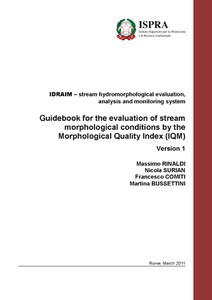Guidebook for rhe evaluation of stream morphological conditions by the Morphological Quality Index (IQM)
This Guidebook illustrates concisely the Italian method for fluvial morphological status assessment through the morphological quality index (IQM), in compliance with the EU Water Framework Directive 2000/60/CE (WFD). As Annexes to this Guidebook, the specific forms for both field activity (.pdf) and evaluation (.xls), and an Illustrated Guide (.pdf) can be downloaded.
The main characteristics of the evaluation method can be summarized as follows: (1) the method is designed to fit with the requirements of the WFD, but it is not exclusive for this scope; (2) it evaluates the morphological conditions (quality) independently from the ecological state; (4) it emphasizes processes and trends of channel adjustments; (5) it represents an overall morphological evaluation rather than a simple survey of morphological features.
The overall assessment is organized in two phases: (1) general setting and segmentation; (2) assessment of present morphological condition. A succession of the following phases is recommended: (1) collection of existing material and information on the reach and catchment; (2) observation and analysis of remote sensing images: during this phase many indicators can be already determined, and a list of the critical points that need to be resolved in the field; (3) field survey: this phase is concentrated on a representative sub-reach, but also includes a check on some specific points along the reach (the ‘field evaluation forms’ are compiled during phases 2 and 3); (4) final measurements from remote sensing – GIS and/or collection of additional information: once the critical points have been resolved in the field, it is possible to finalize the evaluation (the ‘electronic evaluation forms’ are compiled at this stage).
The method, designed primarily for the hydromorphological assessment in compliance with the WFD, is part of a wider methodological framework (named IDRAIM: system for stream hydromorphological assessment, analysis, and monitoring) for the analysis, post-monitoring evaluation and for the design and implementation of the programme of restoration and mitigation measures envisaged by both WFD and by the Flood Directive 2007/60/CE. IDRAIM is therefore a methodological system to support decisions on river management, as it takes into account both the objectives of environmental quality and flood risk mitigation.
Illustrated Guide to the Answer (pdf - 10 Mb)

